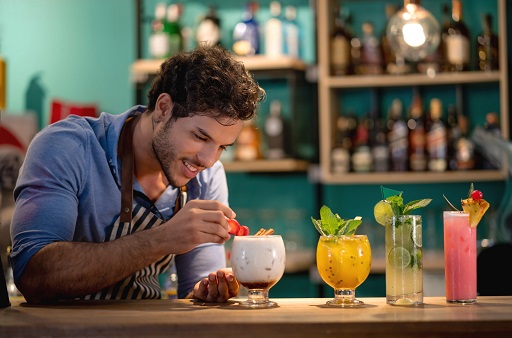The Role of Experiential Learning in Bartending Education
Home » Education » The Role of Experiential Learning in Bartending Education
Experiential learning in bartending education is an art form that requires a delicate balance of theoretical knowledge and practical skill. While understanding cocktail recipes and mixology theories is essential, nothing quite compares to the experience gained through hands-on practice and sensory exploration.
This article explores the significance of experiential learning in bartending education, highlighting how it bridges the gap between theory and tasting and enhances the overall learning experience for aspiring bartenders.
Understanding Experiential Learning:
Experiential learning is a pedagogical approach that emphasizes learning through experience, reflection, and application. In the context of bartending education, including courses for bar owners, involves immersive activities that allow students to engage directly with the materials, tools, and techniques of the trade.
Rather than passively absorbing information from textbooks or lectures, students actively participate in activities such as tastings, cocktail making, and interactions with industry professionals.
The Benefits of Experiential Learning in Bartending Education:
Practical Skill Development:
Experiential learning provides aspiring bartenders with opportunities to hone their practical skills in simulated or real-world environments, which can be facilitated by attending a bartending school in your area, such as California Bartending School or Las Vegas Bartending School. By actively mixing cocktails, practicing pouring techniques, and interacting with customers, students gain confidence and proficiency that cannot be achieved through theory alone.
Sensory Exploration:
Bartending is a multi-sensory experience that involves taste, smell, sight, and touch. Experiential learning activities such as blind tastings and aroma identification exercises help students develop a heightened awareness of flavor profiles, ingredient nuances, and cocktail balance. This sensory exploration deepens their understanding of mixology principles and enhances their ability to create well-crafted drinks.
Real-World Relevance:
Experiential learning immerses students in real-world bartending scenarios, allowing them to apply theoretical concepts in practical contexts. Whether working behind a bar during a busy shift or participating in a cocktail competition, students gain valuable experience that prepares them for the challenges and opportunities they will encounter in their bartending careers.
Collaboration and Communication:
Bartending is not just about making drinks; it’s also about building relationships and providing exceptional customer service. Experiential learning activities encourage collaboration and communication among students, as they work together to create cocktails, solve problems, and engage with patrons. These interpersonal skills are essential for success in the hospitality industry.
Examples of Experiential Learning Activities in Bartending Education:
Cocktail Workshops:
Hands-on cocktail workshops allow students to learn fundamental bartending techniques, experiment with different ingredients, and create their own signature drinks under the guidance of experienced instructors.
Field Trips to Distilleries:
Visiting distilleries provides students with insights into the production process of spirits, from raw ingredients to final products. This firsthand experience enhances their understanding of the ingredients they work with and the craftsmanship behind each bottle.
Guest Lectures and Industry Events:
Inviting guest speakers from the industry to share their expertise and experiences exposes students to diverse perspectives and career pathways within the bartending profession. Attending industry events such as trade shows and cocktail competitions also provides valuable networking opportunities and inspiration.
Conclusion:
Experiential learning plays a vital role in bartending education, enriching the learning experience. Preparing students for success in the dynamic and competitive hospitality industry.
By combining theoretical knowledge with hands-on practice, sensory exploration, and real-world experiences. Aspiring bartenders develop the skills, confidence, and passion needed to craft memorable cocktails. Also, create exceptional guest experiences behind the bar.
Read More:


